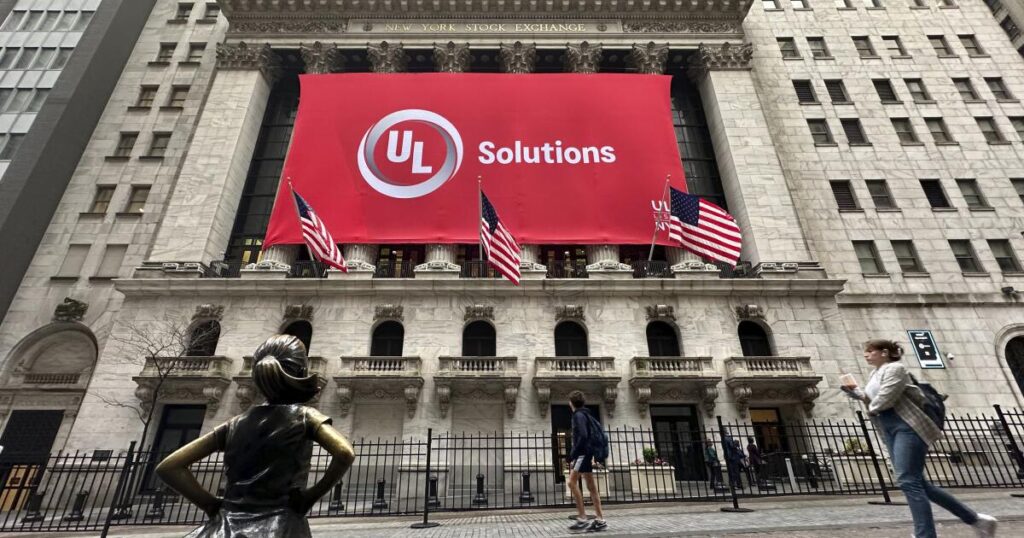US stocks fell on Friday after a mixed start to the earnings reporting season. Concerns about the possibility of escalating tensions in the Middle East have shaken financial markets, prompting investors to look for safer places for their money.
The S&P 500 fell 1.5% to close its worst week since October, when a major rally began on Wall Street. The Dow Jones Industrial Average fell 1.2%, and the Nasdaq Composite Index fell 1.6% from the record it set the previous day.
JPMorgan Chase was one of the heaviest heavyweights in the market. It fell by 6.5% despite announcing stronger profits for the first three months of the year than analysts expected. The country's largest bank gave a forecast for a major source of income this year below Wall Street estimates, calling for only modest growth.
The pressure is always on companies to make greater profits. But it has become particularly acute now given concerns that the other main lever determining stock prices, interest rates, may not provide much support in the near term.
A series of reports this year have shown that inflation and the overall economy remain hotter than expected. This has forced traders to reduce their expectations for the number of times the Federal Reserve will cut its key interest rate this year. Traders are largely betting on just two cuts, according to data from CME Group, down from expectations of at least six cuts at the start of the year.
US stock indexes have already reached record levels, partly due to expectations of such cuts. Without easier interest rates, companies will need to generate larger profits to justify their stock prices, which critics say look expensive by various measures.
The rise in oil prices this year has raised concerns about further upward pressure on inflation. Oil prices rose again on Friday as tensions in the Middle East continued. Israel said it might strike Iran if it launched an attack from its territory after Iranian generals were killed in an explosion targeting the Iranian consulate in Syria.
Brent crude, the international standard, rose 0.8% to $90.45 a barrel. Its price briefly surpassed $92 during the day and is almost back to where it was in October.
At the same time, Treasury yields in the bond market fell and the price of gold rose, which is typical when investors turn to investments considered safer.
The yield on the 10-year Treasury note fell to 4.51% from 4.58% late Thursday. Gold, which had set records, approached $2,450 an ounce for the first time before paring its gains.
Adding to the tension was the release of a preliminary report indicating declining morale among American consumers. It's an important update because American consumer spending is the main driver of the economy.
Perhaps more worryingly, US consumers may have become more pessimistic about inflation. Their expectations for inflation in the next 12 months are at the highest level since December. Such expectations could spark a self-fulfilling prophecy, in which purchases intended to preempt higher prices stoke inflation.
This is why a great deal of scrutiny is placed on corporate profits. Although the downside of a remarkably resilient U.S. economy is a diminished chance of interest rate cuts, the upside is that it should help support sales and profits for companies.
That helped broaden earnings growth to more companies, not just the big tech companies that dominated the market last year, said David Lefkowitz, head of U.S. equities at UBS Global Wealth Management.
For this reason, he expects the S&P 500 to end the year at around 5,200, roughly its closing level on Thursday. He says the index could rise to 5,500 if inflation pressures ease more quickly or corporate earnings growth is stronger than expected.
On Wall Street, Wells Fargo shares fell by 0.4% after swinging between gains and losses during the day. It beat analysts' expectations for Q4's overall earnings. But net interest income, a key component of banks' profits, fell short of expectations.
Citigroup fell 1.7% despite also reporting stronger-than-expected results, while State Street rose 2.5%.
In total, the S&P 500 index fell 75.65 points to 5,123.41. The Dow Jones index fell 475.84 points to 37,983.24 points, and the Nasdaq Composite index fell 267.10 points to 16,175.09 points.
Banks lead reporting season Analysts expect S&P 500 companies to post a third straight quarter of growth, according to FactSet. Next week will include reports from big names like Bank of America, Johnson & Johnson and UnitedHealth Group.
Federal Reserve Chairman Jerome Powell will speak at a closely watched question-and-answer event on Tuesday with the Governor of the Bank of Canada. Other Fed officials will also make statements during the week that could impact traders' expectations about upcoming moves on interest rates and spur subsequent volatility on Wall Street.
Choi writes for the Associated Press. AP writers Matt Ott and Zimo Zhong contributed to this report.
